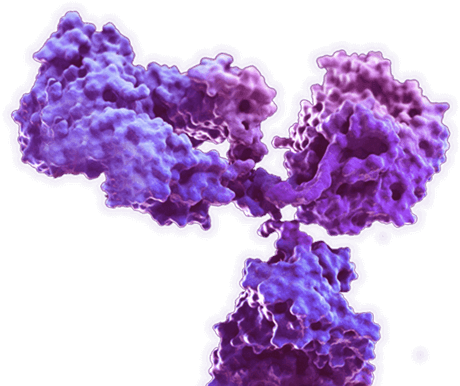Mouse Anti-Sugar beet atpA Antibody (MO-AB-30214H)
Cat: MO-AB-30214H
Certificate of Analysis Lookup
To download a Certificate of Analysis, please enter a lot number in the search box below. Note: Certificate of Analysis not available for kit components.
Lot Number
To download a Certificate of Analysis, please enter a lot number in the search box below. Note: Certificate of Analysis not available for kit components.
Lot Number
| Size: | |
| Conjugate: | |
| Inquiry |
- Product Details
Specifications
| Host species | Mouse (Mus musculus) |
| Species Reactivity | Sugar beet (Beta vulgaris) |
| Clone | MO30214C |
| Specificity | This antibody binds to Sugar beet atpA. |
| Format | Liquid or Lyophilized |
| Storage | Store at 4°C: short-term (1-2weeks) Store at -20°C: long-term and future use |
| Purity | > 90% was determined by SDS-PAGE |
| Purification | Purified with Protein A or G affinity chromatography |
| Cellular Localization | Chloroplast; Other locations |
Application Information
| Application | WB, ELISA |
| Application Notes | ELISA: 1:1000-1:3000 Other applications are to be developed. The optimal dilution should be determined by the end user. |
Target
| Introduction | Mitochondrial membrane ATP synthase (FF ATP synthase or Complex V) produces ATP from ADP in the presence of a proton gradient across the membrane which is generated by electron transport complexes of the respiratory chain. F-type ATPases consist of two structural domains, F - containing the extramembraneous catalytic core, and F - containing the membrane proton channel, linked together by a central stalk and a peripheral stalk. During catalysis, ATP synthesis in the catalytic domain of F is coupled via a rotary mechanism of the central stalk subunits to proton translocation. Subunits alpha and beta form the catalytic core in F. Rotation of the central stalk against the surrounding alphabeta subunits leads to hydrolysis of ATP in three separate catalytic sites on the beta subunits. Subunit alpha does not bear the catalytic high-affinity ATP-binding sites (By similarity). |
| Product Overview | This product is a mouse antibody against atpA. It can be used for atpA detection in Western Blot, Enzyme-Linked Immunosorbent Assay. |
| Alternative Names | ATP synthase subunit alpha; atpA |
| UniProt ID | A0A023ZQ87 |
| Protein Refseq | The length of the protein is 507 amino acids long. The sequence is show below: MLTIRADEISNIIRERVEQYNREVKVVNTGTVLQVGDGIARIHGLDEVMAGELVEFEEGTIGIALNLESNNVGVVLMGDGLMIQEGSSVKATGRIAQIPVSEAYLGRVVNALAKPIDGRGEISASESRLIESPAPGIISRRSVYEPLQTGLIAIDAMIPIGRGQRELIIGDRQTGKTAVATDTILNQQGQNVICVYVAIGQKASSVAQVVTNFQERGAMEYTIVVSETADSPATLQYLAPYTGAALAEYFMYRERHTLIIYDDLSKQAQAYRQMSLLLRRPPGREAYPGDVFYLHSRLLERAAKSSSRLGEGSMTALPIVETQSGDVSAYIPTNVISITDGQIFLSADLFNAGIRPAINVGISVSRVGSAAQIKAMKQVAGKLKLELAQFAELEAFAQFASDLDKATQNQLARGQRLRELLKQPQSAPLTVEEQVMTIYTGTNGYLDSLELEQVRKYLVELRTYVKTNKPELQEIISSTKTFTEEAEALLKEAIQEQMERFLLQEQV. |
See other products for " AtpA "
| MO-DKB-01645W | Rabbit Anti-AtpA Antibody (MO-DKB-01645W) |
| MO-DKB-0067RA | Rabbit Anti-AtpA Antibody (MO-DKB-0067RA) |
| CBMOAB-18713FYB | Mouse Anti-Rice atpA Antibody (CBMOAB-18713FYB) |
| MO-AB-01778L | Mouse Anti-Bromus AtpA Antibody (MO-AB-01778L) |
| MOFAB-286W | Rabbit Anti-ATPA Antibody (MOFAB-286W) |
| CBMOAB-24866FYC | Mouse Anti-Arabidopsis ATPA Antibody (CBMOAB-24866FYC) |
| MO-AB-38861W | Mouse Anti-Grape atpA Antibody (MO-AB-38861W) |
| MO-DKB-01763W | Rabbit Anti-AtpA Antibody (MO-DKB-01763W) |
| MO-AB-00039W | Mouse Anti-Barrel medic atpA Antibody (MO-AB-00039W) |
| CBMOAB-0212YC | Mouse Anti-E. coli atpA Antibody (CBMOAB-0212YC) |
For Research Use Only | Not For Clinical Use.
Online Inquiry


